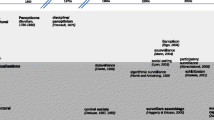Abstract
This essay describes institutional ethnography as a method of inquiry pioneered by Dorothy E. Smith, and introduces a collection of papers which make distinctive contributions to the development of this novel form of investigation. Institutional ethnography is presented as a research strategy which emerges from Smith's wide-ranging explorations of the problematic of the everyday world. Smith's conception of the everyday world as problematic involves a critical departure from the concepts and procedures of more conventional sociologies. She argues for an alternative sociology which begins with the standpoint of the actor in everyday life, rather than from within a professional sociological discourse aligned with the society's ruling institutions. The familiar sociologies of everyday life do not suffice for this purpose, since they deal with local settings and social worlds, but stop short of examining how these are knitted into broader forms of social organization. In contrast, institutional ethnography examines how the scenes of everyday life are shaped by forms of social organization which cannot be fully grasped from within those scenes. The principal tasks of institutional ethnography include describing the coordination of activities in the everyday world, discovering how ideological accounts define those activities in relation to institutional imperatives, and examining the broader social relations in which local sites of activity are embedded. The four papers which follow demonstrate that specific contributions to institutional ethnography can be made in relation to a wide array of topics, methods, and interests.
Similar content being viewed by others
References
Abercrombie, Nicholas, Stephen Hill, and Bryan S. Turner (1984). The Penguin Dictionary of Sociology. Harmondsworth, England: Penguin.
Burawoy, Michael (1998). The Extended Case Method. Sociological Theory 16(1): 4–33.
Foucault, Michel (1977). Discipline and Punish. N.Y.: Basic Books.
Foucault, Michel (1978). The History of Sexuality, Volume 1. An Introduction. N.Y.: Random House.
Garfinkel, Harold (1967). Studies in Ethnomethodology. Englewood Cliffs: Prentice-Hall.
Goffman, Erving (1959). The Presentation of Self in Everyday Life. N.Y.: Anchor Books.
Goffman, Erving (1963). Interaction Ritual. N.Y.: Anchor Books.
Griffith, Alison I. (1984). Ideology, Education, and Single Parent Families: The Normative Ordering of Families Through Schooling. University of Toronto (unpublished Ph.D. thesis).
Habermas, Jürgen (1971). Knowledge and Human Interests. Boston: Beacon Press.
Habermas, Jürgen (1984). The Theory of Communicative Action, Volume I. Reason and the Rationalization of Society. Boston: Beacon Press.
Hammersley, Martin, and Paul Atkinson (1995). Ethnography: Principles in Practice. 2nd edition. London: Routledge.
Heap, James L. (1995). “Foreword.” In Marie Campbell and Ann Manicom (Eds.), Knowledge, Experience, and Ruling Relations: Studies in the Social Organization of Knowledge. Toronto: University of Toronto Press.
Liebow, Elliot (1967). Tally's Corner, A Study of Negro Streetcorner Men. Boston: Little, Brown.
MacLeod, Jay (1995). Ain't No Makin'It, Aspirations and Attainment in a Low-Income Neighborhood. Boulder, CO: Westview Press.
McCall, Michal M. (1996). Postmodernism and Social Inquiry. Symbolic Interaction 19(4): 363–365.
Mann, Susan A. and Lori R. Kelley (1997). Standing at the Crossroads of Modernist Thought: Collins, Smith, and the New Feminist Epistemologies. Gender & Society 11(4): 391–408.
Smith, Dorothy E. (1987). The Everyday World as Problematic, A Feminist Sociology. Toronto: University of Toronto Press.
Smith, Dorothy E. (1990a). The Conceptual Practices of Power, A Feminist Sociology of Knowledge. Toronto: University of Toronto Press.
Smith, Dorothy E. (1990b). Texts, Facts, and Femininity: Exploring the Relations of Ruling. London: Routledge.
Smith, Dorothy E. (1996). Telling the Truth After Postmodernism. Symbolic Interaction 19(3): 171–202.
Smith, Dorothy E. (1997). Response to Susan Mann and Lori Kelley. Gender & Society 11(6): 819–821.
Smith, Dorothy E. (1998). Writing the Social: Critique, Theory, Investigations. Toronto: University of Toronto Press.
Willis, Paul (1977). Learning to Labor. Westmead: Saxon House.
Zimmerman, Don H., and Melvin Pollner (1970). The Everyday World as Phenomenon. In Jack D. Douglas (Ed.), Understanding Everyday Life, Towards the Reconstruction of Sociological Knowledge. Chicago: Aldine.
Rights and permissions
About this article
Cite this article
Grahame, P.R. Ethnography, Institutions, and the Problematic of the Everyday World. Human Studies 21, 347–360 (1998). https://doi.org/10.1023/A:1005469127008
Issue Date:
DOI: https://doi.org/10.1023/A:1005469127008




